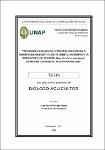Tres niveles de adición del fitobiótico sanacore en el alimento balanceado y su efecto sobre el crecimiento y la supervivencia del camarón, Macrobrachium rosenbergii, distrito de Yurimaguas - Alto Amazonas, 2018

View/
Date
2018Author
Pinedo Flores, Juan Daniel
Flores García, Víctor Luis
Metadata
Show full item recordAbstract
En el presente trabajo de investigación se evaluó la adición de fitobiótico
SANACORE al alimento balanceado y su efecto sobre el crecimiento y la
supervivencia del camarón, Macrobrachium rosenbergii cultivado en jaulas,
durante un periodo de 90 días. El estudio fue realizado del 26 de febrero al 12 de
mayo del 2018, en las instalaciones del Fundo de “Don Alfredo” ubicada a la
altura del Km 4 (margen derecho) de la carretera Yurimaguas – Tarapoto. Se
emplearon 12 unidades experimentales. Las post-larvas de camarón fueron
sembrados con peso promedio inicial de 1.03±0.36 g y con longitud promedio
inicial de 5.13±0.60 cm, con una densidad de siembra de 40 post-larvas/m3. Los
camarones fueron alimentados con alimento balanceado comercial de la marca
Aquatech con un tenor proteico de 30% PB, con 4 tratamientos (T1 = Sin
Fitobiótico, T2 = 20 g/Kg, T3 = 40 g/Kg y T4 = 60 g/Kg) y 3 repeticiones cada una.
Se utilizó una frecuencia alimenticia de 2 veces al día a razón del 8% de la
biomasa total. Al final de estudio, los camarones alcanzaron longitud final de
8.34 cm, 8.53 cm, 8.64 cm y 8.66 cm para los tratamientos T1, T2, T3 y T4
respectivamente, y un peso final de 6.03 g, 6.13 g, 6.27 g y 6.32 cm, para los
tratamientos T1, T2, T3 y T4 respectivamente; mostrando diferencia significativa
tanto en el peso como en la longitud final (p<0.05), más no en la supervivencia.
El registro de los principales parámetros limnológicos monitoreados
quincenalmente estuvieron dentro de los rangos tolerables para la especie
estudiada. In the present research work, the addition of SANACORE phytobiotic to balanced
feed and its effect on the growth and survival of shrimp, Macrobrachium
rosenbergii cultured in cages, was evaluated over a period of 90 days. The study
was conducted from February 26 to May 12, 2018, in the facilities of the "Don
Alfredo" farm located at the height of Km 4 (right margin) of the Yurimaguas -
Tarapoto highway. 12 experimental units were used. Shrimp post-larvae were
planted with an initial average weight of 1.03 ± 0.36 g and initial average length
of 5.13 ± 0.60 cm, with a planting density of 40 post-larvae / m3. The shrimps
were fed commercial balanced feed of the brand Aquatech with a protein
content of 30% PB, with 4 treatments (T1 = Without Phytobiotic, T2 = 20 g / Kg,
T3 = 40 g / Kg and T4 = 60 g/Kg ) and 3 repetitions each. A feeding frequency of 2
times a day was used at a rate of 8% of the total biomass. At the end of the
study, the shrimp reached final length of 8.34 cm, 8.53 cm, 8.64 cm and 8.66 cm
for treatments T1, T2, T3 and T4 respectively, and a final weight of 6.03 g, 6.13 g,
6.27 g and 6.32 cm, for treatments T1, T2, T3 and T4 respectively; showing
significant difference both in weight and in final length (p <0.05), but not in
survival. The record of the main limnological parameters monitored fortnightly
were within the tolerable ranges for the species studied.
Collections
- Tesis [145]
The following license files are associated with this item:

